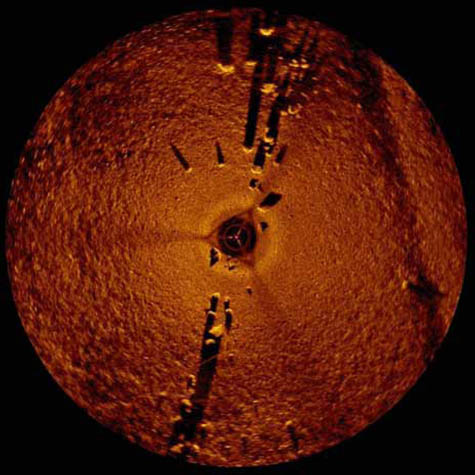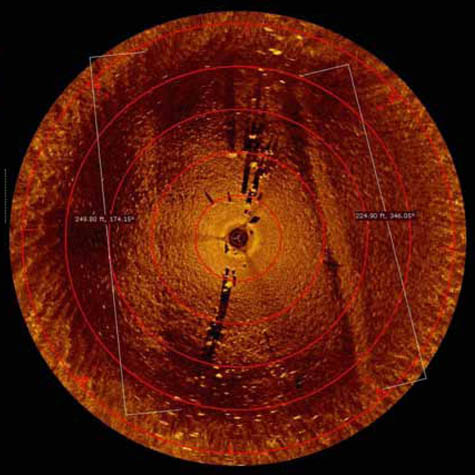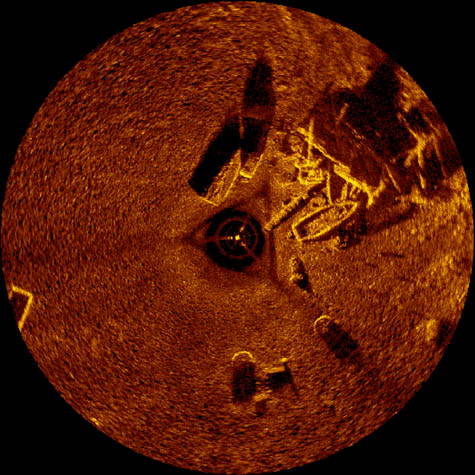Post by blacky on Feb 9, 2010 10:31:20 GMT 10
STONEHENGE BENEATH THE WATERS OF LAKE MICHIGAN

[Image: Standing stones beneath Lake Michigan? View larger].
In a surprisingly under-reported story from 2007, Mark Holley, a professor of underwater archaeology at Northwestern Michigan University College, discovered a series of stones – some of them arranged in a circle and one of which seemed to show carvings of a mastodon – 40-feet beneath the surface waters of Lake Michigan.
If verified, the carvings could be as much as 10,000 years old – coincident with the post-Ice Age presence of both humans and mastodons in the upper midwest.

[Image: The stones beneath Lake Michigan; view larger].
In a PDF assembled by Holley and Brian Abbott to document the expedition, we learn that the archaeologists had been hired to survey a series of old boatwrecks using a slightly repurposed "sector scan sonar" device. You can read about the actual equipment – a Kongsberg-Mesotech MS 1000 – here.
The circular images this thing produces are unreal; like some strange new art-historical branch of landscape representation, they form cryptic dioramas of long-lost wreckage on the lakebed. Shipwrecks (like the Tramp, which went down in 1974); a "junk pile" of old boats and cars; a Civil War-era pier; and even an old buggy are just some of the topographic features the divers discovered.
These are anthropological remains that will soon be part of the lake's geology; they are our future trace fossils.
But down amongst those otherwise mundane human remains were the stones.

[Image: The "junk pile" of old cars and boat skeletons; view larger].
While there is obviously some doubt as to whether or not that really is a mastodon carved on a rock – let alone if it really was human activity that arranged some of the rocks into a Stonehenge-like circle – it's worth pointing out that Michigan does already have petroglyph sites and even standing stones.
A representative of the University of Michigan Museum of Paleontology has even commented that, although he's skeptical, he's interested in learning more, hoping to see better photographs of the so-called "glyph stone."

[Image: The stones; view larger].
So is there a North American version of Stonehenge just sitting up there beneath the glacial waters of a small northern bay in Lake Michigan? If so, are there other submerged prehistoric megaliths waiting to be discovered by some rogue archaeologist armed with a sonar scanner?
Whatever the answer might be, the very suggestion is interesting enough to think about – where underwater archaeology, prehistoric remains, and lost shipwrecks collide to form a midwestern mystery: National Treasure 3 or Da Vinci Code 2. Even Ghostbusters: The Return.
But only future scuba expeditions will be able to tell for sure.

[Image: Standing stones beneath Lake Michigan? View larger].
In a surprisingly under-reported story from 2007, Mark Holley, a professor of underwater archaeology at Northwestern Michigan University College, discovered a series of stones – some of them arranged in a circle and one of which seemed to show carvings of a mastodon – 40-feet beneath the surface waters of Lake Michigan.
If verified, the carvings could be as much as 10,000 years old – coincident with the post-Ice Age presence of both humans and mastodons in the upper midwest.

[Image: The stones beneath Lake Michigan; view larger].
In a PDF assembled by Holley and Brian Abbott to document the expedition, we learn that the archaeologists had been hired to survey a series of old boatwrecks using a slightly repurposed "sector scan sonar" device. You can read about the actual equipment – a Kongsberg-Mesotech MS 1000 – here.
The circular images this thing produces are unreal; like some strange new art-historical branch of landscape representation, they form cryptic dioramas of long-lost wreckage on the lakebed. Shipwrecks (like the Tramp, which went down in 1974); a "junk pile" of old boats and cars; a Civil War-era pier; and even an old buggy are just some of the topographic features the divers discovered.
These are anthropological remains that will soon be part of the lake's geology; they are our future trace fossils.
But down amongst those otherwise mundane human remains were the stones.

[Image: The "junk pile" of old cars and boat skeletons; view larger].
While there is obviously some doubt as to whether or not that really is a mastodon carved on a rock – let alone if it really was human activity that arranged some of the rocks into a Stonehenge-like circle – it's worth pointing out that Michigan does already have petroglyph sites and even standing stones.
A representative of the University of Michigan Museum of Paleontology has even commented that, although he's skeptical, he's interested in learning more, hoping to see better photographs of the so-called "glyph stone."

[Image: The stones; view larger].
So is there a North American version of Stonehenge just sitting up there beneath the glacial waters of a small northern bay in Lake Michigan? If so, are there other submerged prehistoric megaliths waiting to be discovered by some rogue archaeologist armed with a sonar scanner?
Whatever the answer might be, the very suggestion is interesting enough to think about – where underwater archaeology, prehistoric remains, and lost shipwrecks collide to form a midwestern mystery: National Treasure 3 or Da Vinci Code 2. Even Ghostbusters: The Return.
But only future scuba expeditions will be able to tell for sure.








 Happy New Years Everybody!!!
Happy New Years Everybody!!!
